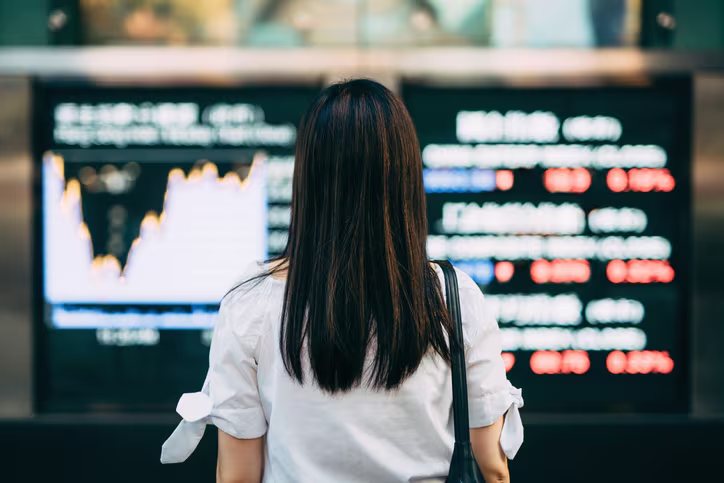The foreign exchange market (forex) is popular with traders for numerous reasons. It’s highly liquid – with more than $US5 trillion on average traded every day – is open around the clock Monday to Friday and is stable enough for brokers to offer leverage (meaning traders can borrow more against their capital) on trades. However, it’s also a highly sophisticated market and traders who rush into it can end up making some very costly mistakes.
- CFD Knowledge Hub
- Trading strategies
- 5 common mistakes forex traders make (and how to avoid them)
5 common mistakes forex traders make (and how to avoid them)

- 1.Not having a trading plan
- 2.Not enough research
- 3.Ignoring economic data and news events
- 4.Hoping bad trades will come good
- 5.Taking quick profits and missing out on larger gains
- 6.Forex trading mistake overviews

Let’s look at five of the biggest ones made by new forex day traders:
Not having a trading plan
If you’re going to become a forex trader, you need a trading plan. Acting without one will almost certainly lead to losses, so before you get started make sure you sit down and write up a list of rules to guide your trading and money management strategies. Here are some of the questions you should be asking yourself before you start forex day trading:
When to enter a trade?
What are the criteria you will use to evaluate a trade – moving averages, economic news etc?
What sort of gains are you targeting?
Which currency pairs should you focus on?
When should I exit a trade?
How much are you willing to lose on a trade?
Where should you set take profit/stop loss trades?
How long will you allow your trade to reach the target you have set?
How much money should I risk on individual trades?
What is your budget?
What amount of leverage is appropriate for your circumstances and risk tolerance?
Not enough research
The world of foreign exchange trading is built on interconnected dynamics. Economics, politics and market fundamentals converge in ways that create opportunities and risks for traders.
Many new traders are lured in by the potential gains on offer but fail to do the necessary research. This is potentially a way to lose money. Successful traders, however, tend to read widely and regularly to educate themselves on trading strategies and keep abreast of potential market-moving events. Here are some of the areas to research on your journey to becoming a trader:
Economics
How interest rates and other economic news (such as trade data, employment and activity) affect currency pairs?
Market fundamentals
What are the market fundamentals driving movements in your chosen currency pairs? What are the technical indicators you need to be aware of to trade successfully?
Money management
What strategies can you follow to maximise profits and minimise losses?
Ignoring economic data and news events
News events like the release of economic data and central bank decisions can have a major impact on currency markets. The good news is that many of these events follow a regular schedule so it’s easy to know when they are coming. Of course, that does not mean it is easy to predict what the news will be, or how markets will react.
Trading on the back of a news event before a trend has been established does not fit all trading plans, but it may suit others. It’s a good idea to pay attention to news and events as these can play a crucial role in determining trends in currency pairs.
Hoping bad trades will come good
One of the worst mistakes new traders make is averaging down: investing more money in a losing trade in the hope of a turnaround. More often than not this amounts to throwing good money after bad and can exacerbate your losses.
The reality is that even if your investment hypothesis is correct, the price of your pair can move against you for longer than you expect. Similarly, holding on to losing positions for too long will prevent you from shifting your capital towards a potentially more successful trade.
Taking quick profits and missing out on larger gains
The key principle of a forex day trader is to minimise loses and maximise profits but, just as some new traders hold on to losing positions for too long, many will also diminish returns by taking profits too early. At first glance this might not sound like much of a mistake – you still made money on the trade after all – but doing it consistently will seriously sap your earning potential.
Unfortunately, this is a harder problem to solve than the other mistakes listed here. There are often good reasons to close a trade earlier than planned, perhaps your pair has unexpectedly entered a period of consolidation or perhaps a piece of news has emerged to alter the trend completely.
Nonetheless, many traders miss out on gains by acting out of fear or greed instead of a rational evaluation of the available technical and/or fundamental indicators. The best solution is once again to create a clear, well-thought-out trading plan and stick to it.
Forex trading mistake overviews
Of course, mistakes are an inevitable part of life for day traders, especially people entering the market for the first time. However, being aware of some of these common mistakes will help you prepare better and minimise your errors and, hopefully, boost your returns. If you’re interested in learning more about currency trading, visit our Forex page.